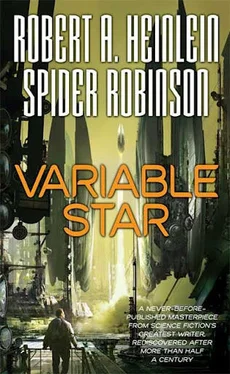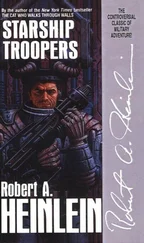The moment I could spare the air, I managed to squeeze four words into the outgoing message traffic, two at a time.
First: “Hello, Evelyn.”
And then: “Hello, Jin.”
Two things made my father special, and only one of them was that he could think better than practically anybody else.
The other was that he could think faster than practically anybody else.
That means more than just getting to the answer before anyone else can. It means you reach answers no one else will. The faster you can think, the longer a logic chain you can follow out before you get tired and decide to stop. In modern physics, that can be crucial. He told me once, “The universe is so simple, it takes very complicated thought to touch it.”
I inherited a touch of his freak speed. It became clear quite early that I emphatically had not inherited Dad’s gift for exotic mathematics—but it was just as clear that he genuinely did not give the least sub-subatomic particle of a damn about that, and maybe that indicates genius of another, completely different kind on his part. But I had mastered the alto sax at seven, playing with a speed that had literally frightened my first teacher, Francis Layne—who himself was called “Fast Layne.” In my secret heart of hearts, I had always honestly believed I was one of the best composers alive, and one of the best saxophonists, too, although I had expected it to be decades before there was much agreement on that. Now, of course, I had it in the bag.
But I had also noticed quite early that I was usually faster on the uptake than most people. Unless the subject was me, anyway. I spent the better part of most conversations waiting for everyone else to catch up. Patterns form and combine in my mind like crystals reproducing at fast forward, sometimes so fast that even to me it seems like I skip whole steps in my logic process and just thumb to the back of the book for the answer. Telepathy is literally instantaneous; maybe sometimes other kinds of thought are, too.
I saw the people present, I knew who all but two of them were, and it seemed that the instant I got over disbelieving the evidence of my eyes, I knew who the two strangers had to be, and how all of them must have gotten here, and why each of them had come, and what their presence could mean. The actual deduction and induction itself didn’t require genius, really—merely a willingness to think the unthinkable. I’d been doing that for weeks. I had most of it worked out by the time I’d stopped laughing.
Jinnia Conrad, when last seen, had been in the market for a new promising young genius-carrier.
Was there the slightest chance her grandfather would not have said to her, “This time, find one in some serious profession. No more damned artists ,” and made it stick? Selecting a sax player had probably been as close as she’d dared come to a gesture of rebellion against her dynastic destiny, tolerated only because of my father’s pedigree.
What was the exact global opposite of a sax player, if not an experimental physicist? Okay, perhaps a financier, but Jinny wasn’t a pervert .
Assume she repeated the pattern, found the male offspring of one or maybe even two of the greatest such tinkerers in recent history, and assume that this lad had inherited the same kind of genius, the urge and ability to take the universe apart and put it back together in different ways with his own hands. He certainly had the eyes of a Tesla. And the naïveté.
Propelled irresistibly by Jinny’s—oh, horrid pun—by her relative-istic drive, and funded by the unlimited resources of the Conrad Family—as if J. P. Morgan had been canny enough to simply find Nikola Tesla a wife who would keep him in harness—was there anything such a genius might not have accomplished?
Suppose he was interested in faster-than-light star drives? His grandfather-in-law would like that.
If he were, he would damn well have a ship equipped with one ready to test within five years, if I knew Jinny.
If he and it survived the initial tests, then the passenger list for its very first official shakedown cruise as a commissioned vessel, long before the rest of the Solar System was told of its existence, was absolutely and beyond question going to include at least two people besides the inventor-pilot: the pilot’s wife, and her grandfather. This voyage would be not merely historic, but conceivably the most historic of all time—no possibility existed that those two names would not be in the first paragraph of the story.
They say luck is the residue of good planning. If the most paranoid man that ever lived ends up being the only one in a position to escape the end of the world with a few playmates for company… can you even call that luck? They must have been on the dark side of Terra, or some other large planet, when it suddenly began to glow around the edges.
If Conrad of Conrad was aboard a small vessel, a minimum of three others were, too.
First and most essential to that paranoid old villain, a very very good and very very very reliable bodyguard. She would be the one I had mistaken for a companion, the cello voice with menace in its undertones. No wonder she looked fit! She could probably fight us all with one hand, while using the other to hold a shield… over her employer. If you’re compelled to try and screw literally everyone you’ll ever meet, you need a strong condom.
Second, Rennick: pan-trained stooge, Speaker To Peasants, flapper, flunky, and designated fall guy should one ever become necessary. Don’t leave the castle without one.
Third, Dorothy Robb: his walking desk, database, secretary, researcher, and necessary impertinent, licensed to sass him occasionally. She had the courage to be willing to pretend every day that she did not fear his terrible power… and the wisdom never to go so far that he began to suspect she really didn’t.
Something about their respective positioning and zero-gee kinesthetics gave me the sudden insight that Jinny’s mocking nickname for Rennick had indeed been aptly chosen. His loyalty to his boss was charged with, if not based on, suppressed eroticism. His body language said his subconscious absurdly considered even ninety-year-old Dorothy Robb a potential rival.
Given the not-terribly-surprising existence of young Gyro Gearloose—if any of them were here, he had to be—I fully understood at once the presence of Jinny, and her grandfather, and all three stooges. The one I had the most trouble explaining to myself was the person I still thought of as “little” Evelyn.
Little she no longer was—but it made little sense that she should be here. If the Conrad superluminal yacht had an extra seat, why hadn’t it gone to some closer relative of Jinny’s than a mere cousin? Why not one of her own parents—or if they were dead or the old man loathed them, Evelyn’s?
All I knew was that her presence was the single most wonderful phenomenon in the Galaxy at that time. I was absolutely certain of that.
I’ve recounted this as if I examined each person there one at a time, and finished with Evelyn, because sentences can’t happen all at the same time. It wasn’t like that. Start to finish, she occupied a huge fraction of my attention and processing time. All the others I saw with peripheral vision—it was my day for clichés come true, and I literally could not take my eyes off her.
The resemblance to Jinny at her age was striking even given their kinship, enough to be eerie. But the differences were just as striking to me, now that I looked. And very dear.
This face was at least as strong as Jinny’s, as determined, as proud. But it was not ruthless. Its eyes were fully as intelligent and alert—but nowhere near as calculating. It was every bit as heartstoppingly beautiful as Jinny’s face had been at nineteen—and more, because it didn’t care. It did not think of its own beauty as a tool, or a weapon.
Читать дальше










